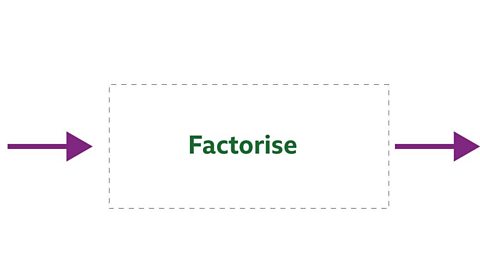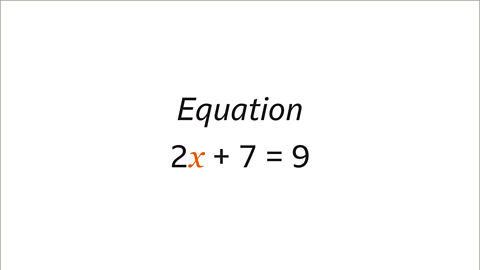Algebraic expressions can be expanded - multiplied by one or more terms.
They may also be simplified - made shorter and simpler by collecting like terms.
Multiplying terms
Example
Simplify \(5 \times 3q\)
Solution
Multiply the numbers and leave out the multiplication sign.
Answer
\(15q\)
The expression \(5 \times 3q\) has been simplified to give \(15q\)
Example
Simplify \(-3t \times -4t\)
Solution
Multiply the numbers
\(-3 \times -4 = +12\)
and then the other terms
\(t \times t = t^2\)
Answer
\(-3t \times -4t = +12t^2\)
or just \(12t^2\)
Example
Simplify \(3kj \times 4j\)
Solution
Multiply the numbers
\(3 \times 4 = 12\)
and then the other terms
\(kj \times j = kj^2\)
Answer
\(12kj^2\)
An answer of \(12j^2k\) is also correct.
The order of the letters in a term is not important but the number must come first.
Test yourself
Simplify \(-5cd \times 4d\)
Solution
Multiply the numbers \(-5 \times 4 = -20\)
and then the other terms
\(cd \times d = cd^2\)
Answer
\(-20cd^2\)
Expanding brackets
When more than one term is to be multiplied, it is usual to put a bracket around the terms.
For example \(t (3m + 5)\) is a shorter way to write \(t \times 3m + t \times 5\)
Therefore
\(t (3m + 5) = 3tm +5t\)
The expression \(t (3m + 5)\) has been expanded to give \(3tm + 5t\)
Example
Expand \(5p (7p - 2)\)
Solution
Multiply each of the terms in the bracket by \(5p\)
Answer
\(35p^2 - 10p\)

Don't forget to multiply both terms in the bracket.
A common mistake is to multiply the first term and forget about the second one.
Expanding and simplifying
Expressions can be expanded by removing brackets and then simplified by adding / subtracting like terms as required.
Example
Expand and simplify \(5 (2c + 3) + c (9 - c)\)
Solution
Expand both brackets
\(5 (2c + 3) + c (9 - c) = 10c + 15 + 9c - c^2\)
Now collect like terms
\(10c + 15 + 9c - c^2\)
\(10c\) and \(9c\) are like terms so we can combine them to give \(19c\)
\(19c + 15 - c^2\)
There are no other like terms so the rest stay the same.
Answer
\(19c + 15 - c^2\)

Remember that \(c\) and \(c^2\) are not like terms and cannot be combined in any way.
The order of the terms in the answer does not matter but the minus sign must stay with the \(c^2\)
\(15 - c^2 + 19c\) and \(-c^2 + 15 + 19c\)
are also correct answers.
\(19c + c^2 - 15\)
is not correct.
Example
Expand and simplify \(5a (2 + b) -3 (4a - b)\)
Solution
Expand both brackets
\(5a (2 + b) - 3 (4a - b)\)
\( = 10a + 5ab - 12a + 3b\)
Now collect like terms
\(10a + 5ab - 12a + 3b\)
\( = -2a + 5ab + 3b\)
There are no other like terms, so the rest stay the same.
Be careful with the signs!
\(-3 \times 4a = -12a\)
and
\(-3 \times -b = +3b\)
Answer
\(5a (2 + b) -3 (4a - b)\)
\( = -2a + 5ab + 3b\)
Test yourself
Expand and simplify \(5c - 2 (c - cd)\)
Solution
There is only one bracket to expand. \(5c\) stays the same.
\(5c - 2 (c - cd) = 5c - 2c + 2cd\)
Remember the terms in the bracket have to be multiplied by \(-2\) not just \(2\)
\(-2 \times c = -2c\)
and \(-2 \times -cd = +2cd\)
Now collect like terms
\(5c - 2c + 2cd = 3c + 2cd\)
Answer
\(5c - 2 (c - cd) = 3c + 2cd\)
Expand and simplify \(3m (m - 7n) + 2n (m - 3n)\)
Solution
Expand both brackets
\(3m (m - 7n) + 2n (m - 3n) = 3m^2 - 21mn + 2nm - 6n^2\)
Now collect like terms
\(3m^2 - 21mn + 2nm - 6n^2 = 3m^2 - 19mn - 6n^2\)
Remember \(-21mn\) and \(+2nm\) are like terms. The order of the letters does not matter.
Answer
\(3m (m - 7n) + 2n (m - 3n) = 3m^2 - 19mn - 6n^2\)
Test yourself
More on M2: Algebra
Find out more by working through a topic
- count3 of 5

- count1 of 5
